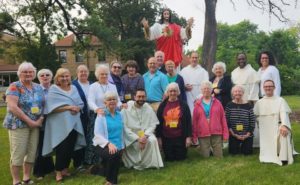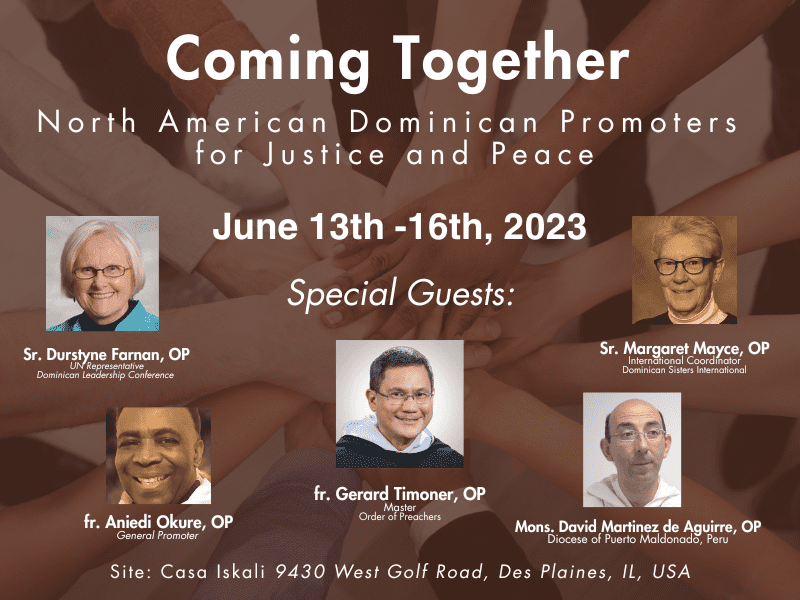By Sister Marcelline Koch, OP
The North American Dominican Justice Promoters were delighted to gather June 13-16, 2023, for their first in-person meeting in three years. Casa Iskali Retreat Center in Des Plaines, Ill, provided a comfortable and welcoming space.
Recognizing that we all are part of something larger than ourselves, the group heard from two Dominican leaders in Rome who joined them virtually. Sister Margaret Mayce, the coordinator of the Dominican Sisters International Confederation, shared stories of sisters in Nigeria, Slovakia, Ukraine, and Zimbabwe. Her input highlighted how Dominicans in those countries live with great intention, clear on the reality of their situations, and their presence—they stay in spite of whatever difficulties. Fr. Gerard Timoner, Master of the Dominican Order, spoke of creating a space for encounters that encourages all to give and receive. “No one is so poor, that they cannot give; no one is so rich, that they cannot receive,” he said.
Healing, restoring, reconciling
He used the image of a bridge builder to describe the Dominican family. In the midst of violence and war, we need to plan for circles of healing, restoration, and reconciliation of humanity.
Our global understanding was enlarged by Sister Dusty Farnan, who represents the Dominican Family at the UN in New York, and Fr. Aniedi Okure, General Promoter for Justice and Peace at the UN in Geneva.
From their vantage points, these two Dominicans see climate change, migration, and war as three major areas impacting our world. Dominicans are present in 120 countries and can give first-hand testimony about what is happening in those nations. For example, at the Solomon Islands Dominican gathering last year, the Dominicans and the people of the region testified that the slaughter of the forest changed the climate and caused soil erosion, displacement of wild animals, and a menacing growth of insects.
The Dominican presence at the UN is a trusted voice. Dominicans contribute to an understanding of the true impact of global issues on the people and places that suffer the consequences. UN leaders depend on the first-hand knowledge and personal experience of those living in the areas and working directly with the people. And Dominicans sometimes assist with bringing persons from conflict areas to the UN in person to share in their own voices.
Another global voice to join us virtually was Msgr. David Martinez de Aguirre, a Dominican friar from Puerto Maldonado, Peru. What a privilege to hear Bishop Martinez to speak of his love for the place and the people of Amazonia. The Amazon will be the focus of the annual Dominican Month of Peace this Advent.
"In the midst of violence and war, we need to plan for circles of healing, restoration, and reconciliation of humanity."
Querida Amazonia
Asking why the Order should be interested in Amazonia, Bishop Martinez de Aguirre cited Pope Francis’s words from Querida Amazonia (Beloved Amazon) §5
The Amazon region is a multinational and interconnected whole, a great biome shared by nine countries: Brazil, Bolivia, Colombia, Ecuador, Guyana, Peru, Surinam, Venezuela and the territory of French Guiana. Yet I am addressing the present exhortation to the whole world. I am doing so to help awaken their affection and concern for that land which is also “ours,” and to invite them to value it and acknowledge it as a sacred mystery. But also because the Church’s concern for the problems of this area obliges us to discuss, however briefly, a number of other important issues that can assist other areas of our world in confronting their own challenges.
We will all learn more about the Amazon in preparation for and during the Month of Peace, an annual Dominican Family event that begins the First Sunday of Advent and ends on January 1, the World Day of Peace.
When asked what was his hope from the focus on the Amazon for this upcoming month, Bishop Martinez said he wanted “people to fall in love with the Amazon.” It is important for Dominicans to be touched and transformed by coming to know a little about the vast rainforest ecosystem vital to the planet's health, one that is home to hundreds of indigenous tribes. The Amazon is where important changes can occur—for the Church, the planet, and the world.
Our speakers challenged us to explore what being part of a global family means. What can we learn and receive from others through their lives and stories? How can we strengthen our intentionality of and attention to the interconnectedness of all?


